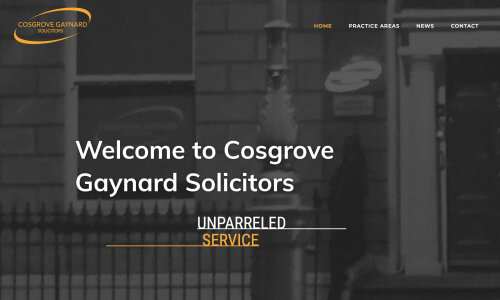Best Sanctions & Export Controls Lawyers in Dublin
Share your needs with us, get contacted by law firms.
Free. Takes 2 min.
List of the best lawyers in Dublin, Ireland
About Sanctions & Export Controls Law in Dublin, Ireland
Sanctions and export controls are legal frameworks that regulate the movement of goods, services, technology, and funds across borders. In Dublin, Ireland, these laws play a crucial role in ensuring that businesses and individuals comply with national and international obligations, such as those imposed by the European Union (EU) and the United Nations (UN). The primary aim is to promote national security, foreign policy objectives, and prevent illicit activities such as terrorism financing, proliferation of weapons of mass destruction, or human rights abuses.
Ireland, as an EU member state, implements and enforces all EU sanctions and export control measures. These regulations may apply to a wide range of products, including dual-use items (goods and technologies that have both civilian and military applications), military equipment, controlled chemicals, or specific financial transactions. All organizations and individuals in Dublin must ensure that their activities comply with these requirements to avoid severe penalties and maintain business integrity.
Why You May Need a Lawyer
Sanctions and export controls regulations can be highly complex and are subject to frequent changes, often in response to global events. Legal assistance is crucial in many situations, including:
- If you operate a business involved in international trade, especially with countries or entities subject to sanctions or export restrictions.
- If you are unsure whether your products or services fall within the scope of dual-use or military items controls.
- If you need to conduct due diligence on customers, suppliers, or financial partners for potential sanctions exposure.
- If facing an investigation or enforcement action from Irish or European authorities for possible sanctions or export control violations.
- If your company wishes to apply for export licenses, authorizations, or exceptions.
- If you require advice on implementing or updating internal compliance programs.
- If you have received a blocked or frozen transaction notice from a bank.
- If you need guidance in responding to requests for information from authorities.
- If you are involved in mergers, acquisitions, or investments that could trigger sanctions or export control concerns.
- If you need representation in administrative or judicial proceedings related to these laws.
Local Laws Overview
In Dublin, Ireland, sanctions and export controls laws are primarily governed by EU regulations, which have direct effect in all member states. Some of the key frameworks include:
- EU Sanctions Regulations - These impose restrictions on trade, financial transactions, and economic cooperation with specific countries, entities, or individuals. Ireland is required to enforce all EU sanctions measures in full.
- Dual-Use Regulation (EU Regulation 2021/821) - Governs the export, transfer, brokering, and transit of dual-use items, such as advanced electronics, encryption software, or chemicals with both civil and military uses.
- Irish national controls - Supplementing EU law, Ireland operates its own controls on military goods and technologies under the Control of Exports Act 2008 and the associated Control of Exports Orders.
- Financial Sanctions - The Central Bank of Ireland is responsible for administering and monitoring the implementation of financial sanctions in the country.
- Reporting and licensing requirements - Companies may need to obtain permits or licenses from authorities like the Department of Enterprise, Trade and Employment (DETE) before exporting controlled goods or technology.
Non-compliance can lead to significant administrative penalties, potential criminal prosecution, reputational harm, and severe disruption to business operations.
Frequently Asked Questions
What are sanctions and who imposes them in Ireland?
Sanctions are restrictive measures imposed to achieve foreign policy or security objectives. In Ireland, all EU-mandated sanctions automatically apply, along with UN sanctions. There may also be specific Irish restrictions in place.
What is export control and how does it affect businesses in Dublin?
Export control is the regulatory framework that restricts the export, transit, or brokering of certain goods and technologies, particularly those with potential military or dual-use purposes. Businesses in Dublin must comply with these regulations when exporting applicable products or sharing sensitive technology, even via email or cloud storage.
Which goods are considered dual-use?
Dual-use goods are items, software, or technologies that can be used for both civilian and military applications. Examples include advanced electronics, telecommunications equipment, cryptography, certain chemicals, or specialized machinery. The specific classification is set out in the EU Dual-Use List.
How do I know if my customer or transaction is subject to sanctions?
You should conduct due diligence, including screening customers and transactions against EU and UN sanctions lists. If a customer, end-user, or transaction features on these lists, restrictions or prohibitions may apply.
What licenses or authorizations do I need to export controlled items?
Depending on the nature of the goods and the destination country, you may need to apply for an export license or authorization from the Department of Enterprise, Trade and Employment (DETE) or other relevant authorities.
What are the penalties for breaching sanctions or export control laws in Ireland?
Penalties range from administrative fines to criminal prosecution, which may include substantial fines and imprisonment, depending on the severity and nature of the breach.
Can my financial transactions be affected by sanctions?
Yes. Banks in Ireland must check transactions against applicable sanctions lists. If a transaction involves a sanctioned country, entity, or individual, the funds may be blocked or the transaction refused.
What should I do if I receive a notice of investigation or inquiry from the authorities?
You should seek immediate legal advice from a specialist in sanctions and export controls law. Prompt action can help protect your interests and ensure compliance during the inquiry or investigation process.
How often do sanctions and export control laws change?
Sanctions and export controls can change frequently, often in response to international events or as part of regular legislative updates. Keeping up-to-date with official publications and seeking regular legal review is essential.
Where can I obtain official guidance or further information?
Official guidance is available from governmental departments such as the Department of Enterprise, Trade and Employment, the Central Bank of Ireland, and relevant EU bodies.
Additional Resources
If you need further information, support, or official documents related to sanctions and export controls in Dublin, Ireland, consider these resources:
- Department of Enterprise, Trade and Employment (DETE) - Responsible for export licenses and official guidance on controlled goods and dual-use items.
- Central Bank of Ireland - Administers and oversees financial sanctions.
- Revenue Commissioners - Information on customs requirements and import-export controls.
- European Commission - Directorate-General for Trade - Maintains the EU Dual-Use Control List and provides updates on sanctions and export controls.
- Irish Exporters Association - Offers support and advice for companies involved in international trade.
- Legal professional bodies, such as the Law Society of Ireland, which can help you find specialist legal practitioners.
Next Steps
If you require legal assistance regarding sanctions and export controls in Dublin, Ireland, consider taking the following steps:
- Identify the specific issue or concern you are facing, such as potential exposure to sanctions, export licensing needs, or investigation by authorities.
- Gather all relevant documents and information, including product specifications, transaction details, correspondence, and any notices received from authorities or banks.
- Contact a qualified Irish lawyer or legal advisor who specializes in sanctions and export controls. You may search through the Law Society of Ireland or seek recommendations from trade organizations.
- Arrange a consultation to outline your situation and receive tailored advice on compliance obligations, risk mitigation, or response strategies.
- Stay updated by subscribing to official government updates or industry newsletters to remain aware of regulatory changes.
By acting promptly, you can ensure compliance, minimize risk, and safeguard your business or individual interests when dealing with sanctions and export controls in Dublin, Ireland.
Lawzana helps you find the best lawyers and law firms in Dublin through a curated and pre-screened list of qualified legal professionals. Our platform offers rankings and detailed profiles of attorneys and law firms, allowing you to compare based on practice areas, including Sanctions & Export Controls, experience, and client feedback.
Each profile includes a description of the firm's areas of practice, client reviews, team members and partners, year of establishment, spoken languages, office locations, contact information, social media presence, and any published articles or resources. Most firms on our platform speak English and are experienced in both local and international legal matters.
Get a quote from top-rated law firms in Dublin, Ireland — quickly, securely, and without unnecessary hassle.
Disclaimer:
The information provided on this page is for general informational purposes only and does not constitute legal advice. While we strive to ensure the accuracy and relevance of the content, legal information may change over time, and interpretations of the law can vary. You should always consult with a qualified legal professional for advice specific to your situation.
We disclaim all liability for actions taken or not taken based on the content of this page. If you believe any information is incorrect or outdated, please contact us, and we will review and update it where appropriate.















